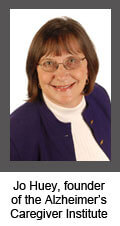 This is part of an ongoing series of guest blogs written by Jo Huey, the Alzheimer’s Advocate®, founder of the Alzheimer’s Caregiver Institute.
This is part of an ongoing series of guest blogs written by Jo Huey, the Alzheimer’s Advocate®, founder of the Alzheimer’s Caregiver Institute.
In our last post, we explored the 2nd Absolute of communicating with someone who has Alzheimer’s: Never reason, instead divert.
Today, we’ll explore the Third Absolute:
#3: Never shame, instead distract.
If I hadn’t already copyrighted these Ten Absolutes, I would change the word “shame” to “embarrass.” The meaning is essentially the same, but the term seems better.
We’ve all had “Duh!” moments, when we were truly embarrassed, perhaps even ashamed, of something we said or did. Imagine how much worse this would be if it were witnessed and pointed out to everyone around. How would you feel?
When caring for someone with Alzheimer’s or dementia, it’s important to remember that the parts of their brain that control short-term memories, language and logical thinking have been impaired. They most likely don’t realize what they’re saying or doing could be viewed as inappropriate.
For example, if you run into a friend at a restaurant, and the person with Alzheimer’s takes a sip of their water, avoid accusing them of doing something wrong.
Keep in mind that the person with Alzheimer’s may not remember drinking the water just seconds ago. Even if they do remember, they may not be aware it was someone else’s. They were thirsty, and the water was there. In their mind, it seemed appropriate to take a sip to quench their thirst.
A kinder approach would be to change the subject as quickly as possible. Ask if you can pull up a chair, and hand the water to the person with Alzheimer’s. Motion to the waiter and ask for two fresh waters (one “replacement” and the other for yourself).
If there isn’t time, just tell your friend, “I’ll catch up with you later.” Move along without mentioning the water, and even suggest to the person with Alzheimer’s that you stop for ice cream on the way home.
If your friend wasn’t already aware of your loved one’s situation, call them later to “catch up” and use the water incident to segue into a conversation about the challenges you’ve been facing.
In our next post, we’ll explore the fourth absolute: Never lecture, instead reassure.
Explore the in-home Alzheimer's care services provided by Home Helpers »
The views expressed are those of the author and do not necessarily represent the views of H.H. Franchising Systems, Inc.

